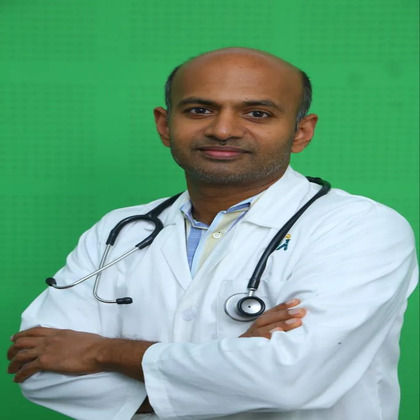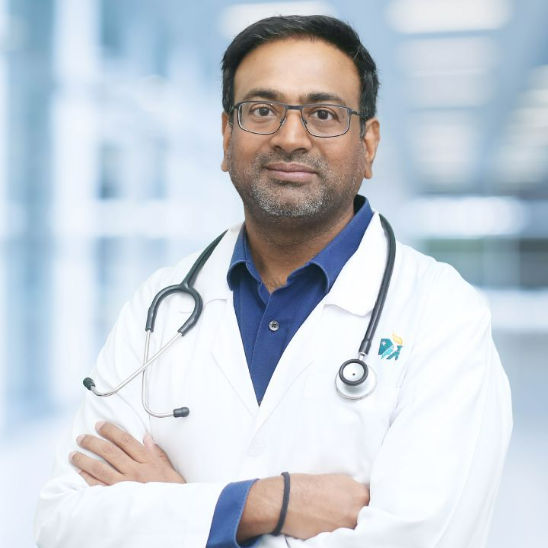Welcome User
Relevance
Consult Surgical Gastroenterologists Online (80 doctors)
Dr Paramesh K N
Surgical Gastroenterologist
12 Years • MBBS, MS General Surgery, DNB Surgical Gastroenterology
Hyderabad
DR PARAMESH KN Clinic, Hyderabad

Dr. Manish Joshi
Surgical Gastroenterologist
25 Years • MBBS MS (General Surgery), MRCS, DNB (Surgical Gastroenterology)
Bengaluru
Q Medical centre and hospital, Bengaluru
(225+ Patients)
Dr. Brijesh Heda
Surgical Gastroenterologist
25 Years • MS,FIAGES (GENERAL SURGERY)
Harda
Shree Venkatesh Hospital, Harda
Dr Sudheer Moodadla
Surgical Gastroenterologist
12 Years • MBBS, MS General Surgery, DrNB Surgical Gastroenterology
Arepally
APOLLO REACH NSR HOSPITALS, Arepally

Dr. Rakesh R
Surgical Gastroenterologist
15 Years • MBBS, MS (General Surgery), MCH (Surgical Gastroenterology)
Bengaluru
KRISH HOSPITAL - GUNJUR., Bengaluru
(150+ Patients)

Dr. Shivaraj Afzalpurkar
Gastroenterology/gi Medicine Specialist
13 Years • MBBS, MD General medicine (Gold medalist), DrNB (Gastroenterology), MNAMS
Bengaluru
Apollo Clinic, JP nagar, Bengaluru

Dr. Sagar H C
Surgical Gastroenterologist
15 Years • MBBS, MS General Surgery, DNB Surgical Gastroenterology
Bengaluru
Apollo Clinic, JP nagar, Bengaluru

Dr. Chinnaya Parimi
Surgical Gastroenterologist
22 Years • MS, FACS
Hyderabad
Apollo Medical Centre Kondapur, Hyderabad

Dr. B Sujeeth Kumar
Surgical Gastroenterologist
16 Years • MBBS, MS(General Surgery), FIAGES(Minimal Access Surgery), FAIS, FALS (Advanced Laparoscopic Colorectal Surgery), DIPMAS(Minimal Access Hernia Surgery), FICRS (Robotic Surgery)
Manikonda Jagir
Apollo Clinic, Manikonda, Manikonda Jagir
Dr.n.subrahmaneswara Babu
Surgical Gastroenterologist
16 Years • MS, FMAS, DrNB-GI Surgery, PDF-HPB Surgery
Secunderabad
Apollo Hospitals Secunderabad, Secunderabad
(400+ Patients)
Book Consult for Surgical Gastroenterology Online
Experience hassle-free access to top surgical gastroenterologists through Apollo 24|7's online booking system. Our user-friendly platform allows you to easily schedule appointments with trusted specialists at renowned hospitals and clinics, ensuring you receive the best care for your gastrointestinal concerns. With a wide range of convenient appointment slots available, you can consult with an expert surgical gastroenterologist from the comfort of your home or office. Don't let digestive issues disrupt your life any longer; book your consultation with a skilled surgical gastroenterologist at Apollo 24|7 today and take the first step towards better gastrointestinal health.
What is Surgical Gastroenterology?
Surgical gastroenterology is a medical speciality focused on the surgical treatment of diseases and disorders affecting the gastrointestinal tract. This encompasses all organs from the oesophagus to the rectum, along with the pancreas, gallbladder, and liver. The speciality is crucial for addressing complex digestive issues that cannot be managed with medication alone.
It plays a vital role in healthcare by offering interventions that can alleviate chronic pain, improve digestive functioning, and in some cases, save lives. Surgical gastroenterologists work closely with diagnostic radiologists, gastroenterologists, and oncologists to provide comprehensive care tailored to the needs of individual patients.
Who is a Surgical Gastroenterologist?
A surgical gastroenterologist is a highly qualified specialist who manages and treats conditions related to the digestive system. To become a gastrointestinal surgeon, one must undergo extensive training in general surgery followed by additional specialised training in the field of gastroenterology surgery.
These professionals possess a deep understanding of the anatomy and physiology of the gastrointestinal system, enabling them to perform complex surgeries to treat conditions such as stomach ulcers, cancerous growths, and inflammatory bowel disease. Their expertise is essential in hospitals and medical centres where advanced interventions are required to manage severe gastrointestinal disorders.
What Does a Surgical Gastroenterologist Do?
A surgical gastroenterologist specialises in diagnosing and treating conditions of the gastrointestinal tract and related organs, including the stomach, intestines, liver, and pancreas. This professional blends advanced surgical techniques with a deep understanding of gastrointestinal diseases to offer both routine and complex treatments.
Diagnosis and Assessment: The first responsibility of a surgical gastroenterologist is to diagnose complex gastrointestinal conditions using various diagnostic tools like endoscopies, biopsies, and imaging studies. This initial step is crucial for planning the appropriate surgical or treatment approach.
Surgical Interventions: They perform a range of surgeries, from minimally invasive laparoscopic procedures to major operations like removal of tumours or damaged sections of the gut. The choice of surgery depends on the severity and location of the disease.
Patient Management: Post-surgery, they manage the patient’s recovery process. This includes pain management, monitoring for complications, and coordinating with other healthcare professionals to provide comprehensive care.
Follow-up Care: Ensuring long-term health through regular follow-ups is key. They assess the healing process, make dietary recommendations, and adjust any medications needed to help the patient return to normal life.
Research and Education: Many surgical gastroenterologists are also involved in research and training, staying updated with the latest techniques and improving existing ones. They may also educate medical students and residents in surgical practices and patient care.
Their daily activities vary significantly, but all aim to provide targeted and effective treatment to improve and sustain patients’ health.
What are the Other Sub-specialities of Surgical Gastroenterology?
Surgical gastroenterology encompasses several sub-specialities, each focusing on different parts of the gastrointestinal system and related organs. Here’s a look at some of these specific areas:
Hepato-Pancreato-Biliary Surgery: This sub-speciality deals with diseases of the liver, pancreas, gallbladder, and bile ducts. Surgeons in this field, including the liver surgeon, are skilled in managing complex conditions such as liver cirrhosis, pancreatic cancer, and gallstones through both surgical and non-surgical treatments.
Gastrointestinal Oncology Surgery: Specialising in the surgical treatment of cancers within the gastrointestinal tract, these surgeons handle tumours in the stomach, liver, pancreas, and colon. Their expertise is crucial for the surgical removal of malignant tissues and performing reconstructive surgery to restore function.
Bariatric and Metabolic Surgery: Focused on treating obesity and related metabolic diseases, this sub-speciality offers surgical options like gastric bypass or sleeve gastrectomy to help reduce weight and improve overall health.
Minimally Invasive Gastrointestinal Surgery: This area uses techniques such as laparoscopy to perform surgeries with smaller incisions, which generally results in quicker patient recovery, less pain, and reduced risk of such as diabetes infection. A doctor for hernia surgery often utilises these techniques to repair abdominal hernias with minimal discomfort to patients.
Colorectal Surgery: Surgeons in this sub-speciality, including the colon cancer surgeon, focus on the lower gastrointestinal tract, particularly the colon, rectum, and anus. They manage diseases such as colon cancer, inflammatory bowel disease, and anal fissures.
Upper Gastrointestinal Surgery: This sub-speciality deals with disorders of the oesophagus, stomach, and duodenum. Surgeons treat conditions such as stomach cancer, peptic ulcers, and gastroesophageal reflux disease, often collaborating with a doctor for stomach issues to ensure comprehensive care.
Liver Transplant Surgery: These surgeons perform transplants to replace diseased livers with healthy ones from donors. They manage the entire transplant process, from the surgical procedure to post-operative care and long-term follow-up with patients.
Pancreatic Surgery: Specialising in the pancreas and includes the management of pancreatic cancer, pancreatitis, and pancreatic cysts. A doctor for colon surgery might also engage in treating overlapping areas of concern within the abdominal cavity, ensuring a holistic approach to patient health.
Each of these sub-specialities plays a vital role in managing complex gastrointestinal issues, and providing targeted interventions to improve patient outcomes.
What are the Surgical Gastroenterology Examinations or Tests Performed by the Surgical Gastroenterologist?
Surgical gastroenterologists perform a variety of diagnostic tests and examinations to identify and evaluate gastrointestinal conditions. Here are some of the most common procedures within this speciality:
Endoscopy: This involves inserting a flexible tube with a camera into the digestive tract through the mouth or rectum. It allows the doctor to visually examine the interior surfaces of the oesophagus, stomach, and beginning of the small intestine or colon.
Colonoscopy: Similar to an endoscopy, this test specifically examines the colon and rectum. It's essential for detecting inflamed tissue, ulcers, and abnormal growths, and is crucial in screening for colon cancer.
ERCP (Endoscopic Retrograde Cholangiopancreatography): This technique combines endoscopy and X-ray imaging to examine the pancreatic and bile ducts. It’s particularly useful for identifying stones, tumours, or narrowing of these ducts.
Capsule Endoscopy: Patients swallow a small, pill-sized camera that captures images of the small intestine, which are hard to reach with conventional endoscopy. This test is particularly useful for diagnosing conditions like Crohn's disease.
Biopsy: During an endoscopy or colonoscopy, the surgical gastroenterologist may take small samples of tissue to be analysed for signs of disease.
Motility Testing: These tests measure the movement and pressure in the gastrointestinal tract, helping to diagnose conditions that affect the regular movement of food through the intestines, such as achalasia or gastroparesis.
pH Monitoring: This test measures the acidity in the oesophagus to identify gastroesophageal reflux disease (GERD) and determine its severity.
These examinations are fundamental in diagnosing diseases, planning surgeries, and monitoring the effectiveness of treatments. If you need a thorough diagnosis or treatment plan, you may want to book a surgical gastroenterologist who can provide comprehensive care and expert management of digestive health issues.
What are the Common Conditions & Diseases that Surgical Gastroenterologists Treat?
Surgical gastroenterologists are skilled in managing a range of complex conditions and diseases of the digestive system. Here are the top 15 conditions they commonly treat:
Gallstones: Hardened deposits of digestive fluid that form in the gallbladder, often causing pain and infection.
Hernias: Occurs when an organ or fatty tissue squeezes through a weak spot in a surrounding muscle or connective tissue.
Gastroesophageal Reflux Disease (GERD): A chronic condition where stomach acid frequently flows back into the tube connecting your mouth and stomach (oesophagus).
Peptic Ulcers: Sores that develop on the inside lining of your stomach and the upper portion of your small intestine.
Appendicitis: Inflammation of the appendix, a small tube attached to the large intestine, which can cause severe abdominal pain.
Inflammatory Bowel Disease (IBD): Includes Crohn’s disease and ulcerative colitis, which cause long-term inflammation of the digestive tract.
Diverticulitis: Inflammation or infection of small pouches that can form along the walls of the colon.
Colon Cancer: A malignant growth in the colon, part of the large intestine.
Pancreatitis: Inflammation of the pancreas, which can occur as acute or chronic episodes.
Liver Cancer: A cancer that starts in the liver, often related to liver diseases such as hepatitis or cirrhosis.
Bowel Obstruction: A blockage that prevents food or liquid from passing through the small or large intestine.
Anal Fissures: Small tears in the lining of the anus, which can cause pain and bleeding during bowel movements.
Gastric Cancers: Cancer that forms in the stomach, often resulting from long-standing inflammation and lifestyle factors.
Oesophageal Cancer: A cancerous growth in the oesophagus, which can affect swallowing and digestion.
Rectal Prolapse: Occurs when the rectum drops down into or through the anal opening.
Each of these conditions requires specific diagnostic tests and tailored treatment approaches, which may include medication, lifestyle adjustments, or surgical interventions, depending on severity and patient health.
Reasons to See a Surgical Gastroenterologist
Consulting a surgical gastroenterologist is essential when experiencing severe or persistent symptoms related to the digestive system that do not improve with general medical treatment. Here are the primary reasons to seek their expertise:
Chronic Abdominal Pain: Persistent or intense stomach pain that could indicate conditions like gallstones or hernias.
Unexplained Weight Loss: Significant weight loss without trying could be a sign of a serious digestive issue, such as cancer.
Difficulty Swallowing: If swallowing food becomes painful or challenging, it might indicate an issue with the oesophagus.
Bloody Stools: Visible blood in stools can be a sign of colon cancer or inflammatory bowel disease.
Persistent Nausea or Vomiting: Long-lasting nausea or vomiting can be a symptom of a blockage or other serious conditions.
For those unable to visit a clinic, an online surgical gastroenterologist consultation can provide preliminary assessments and guidance on necessary diagnostic tests or procedures.
What Types of Procedures do Surgical Gastroenterologists Perform?
Surgical gastroenterologists are skilled in a variety of procedures, divided into two main types: therapeutic interventions and surgical operations. Here’s a closer look at the top procedures within each category.
Top Therapies
Endoscopic Retrograde Cholangiopancreatography (ERCP): This combines endoscopy and fluoroscopy to diagnose and treat bile or pancreatic duct conditions.
Endoscopic Ultrasound (EUS): Uses ultrasound technology via an endoscope to assess digestive (gastrointestinal) and lung diseases.
Sigmoidoscopy: Allows for the examination and treatment of problems in the lower colon and rectum.
Capsule Endoscopy: Patients swallow a small camera that captures images of the small intestine, used for diagnosing conditions like Crohn's disease.
Percutaneous Endoscopic Gastrostomy (PEG): Involves placing a feeding tube into the stomach through the abdominal wall to provide nutrition.
Top Surgeries
Colectomy: Surgical removal of all or part of the colon, often due to cancer or severe IBD.
Cholecystectomy: Removal of the gallbladder, commonly performed to treat gallstones.
Haemorrhoidectomy: Surgical removal of haemorrhoids, providing relief from bleeding and discomfort.
Appendectomy: Removal of the appendix, usually due to acute appendicitis.
Gastrectomy: Partial or total removal of the stomach, often due to cancer.
Each procedure requires specific expertise and careful patient evaluation. The surgical gastroenterologist fee may vary widely depending on the complexity and nature of the procedure performed.
Why Choose an Apollo 24|7 Surgical Gastroenterologist?
Apollo 24|7 surgical gastroenterologists are renowned for their expertise, qualifications, and commitment to providing exceptional patient care. Our specialists have undergone rigorous training and possess extensive experience in managing complex gastrointestinal conditions. They are skilled in the latest minimally invasive surgical techniques and advanced endoscopic procedures, ensuring optimal patient outcomes.
At Apollo 24|7, we offer personalised care tailored to each patient's unique health needs and concerns. Our surgical gastroenterologists work closely with patients to develop comprehensive treatment plans that address their specific condition and goals.
We provide seamless access to consultations, both online and in-clinic, making it convenient for patients to seek expert medical advice and treatment. Our holistic approach to healthcare ensures that patients receive comprehensive care from diagnosis through treatment and follow-up, all under one roof.
What to Expect When Visiting a Surgical Gastroenterologist?
When visiting a surgical gastroenterologist, patients can expect a thorough and focused approach to diagnosing and treating complex gastrointestinal issues. Here’s what typically happens during a visit:
Initial Consultation: The specialist will review your medical history and discuss the symptoms you are experiencing. This conversation helps to guide further diagnostic tests.
Diagnostic Assessments: You may undergo diagnostic procedures such as endoscopies or imaging tests, which help pinpoint the exact nature of your condition.
Treatment Planning: Based on the diagnosis, the gastroenterologist will outline a treatment plan. This could include medication, lifestyle changes, or surgery.
Follow-up: Regular follow-ups will be scheduled to monitor progress and make any necessary adjustments to the treatment.
Patients should consider reading surgical gastroenterologist reviews to choose a specialist with a good reputation and satisfactory patient outcomes. If you are looking for a specialist, searching for a surgical gastroenterologist near me online can help locate the most convenient options available.
How Can I Get an Appointment With a Surgical Gastroenterologist?
Getting an appointment with a surgical gastroenterologist at Apollo 24|7 is easy and convenient. Here's how you can book a consultation:
Online Appointment: Visit the Apollo 24|7 website and navigate to the "Book Appointment" section. Select "Surgical Gastroenterology" from the list of specialities and choose your preferred surgical gastroenterologist. Select a convenient date and time for your consultation and provide the necessary details to confirm your appointment.
Apollo 24|7 App: Download the Apollo 24|7 app on your smartphone and log in or create an account. Tap on the "Consult" tab and select "Surgical Gastroenterology" from the list of specialities. Choose your preferred surgical gastroenterologist and select a convenient date and time for your consultation. Provide the necessary details to confirm your appointment.
Offline Appointment: You can also book an appointment by calling the Apollo 24|7 helpline or visiting your nearest Apollo Hospital. Provide the necessary details, including your preferred surgical gastroenterologist and convenient date and time for your consultation.
Referrals: If you have been referred to a surgical gastroenterologist by another healthcare provider, you can contact Apollo 24|7 to schedule an appointment and provide the relevant referral information.
FAQs
What is gastrointestinal surgery treatment?
Gastrointestinal surgery treatment involves medical procedures targeting the digestive system, including the stomach, intestines, and related organs. It addresses conditions such as cancers, hernias, and inflammatory diseases, aiming to remove blockages, repair damaged tissues, or manage malignancies.
What is the difference between a gastrologist and a gastroenterologist?
A gastrologist is an informal term sometimes used for a gastroenterologist, but it's not officially recognised. A gastroenterologist specialises in diagnosing and treating diseases of the gastrointestinal tract non-surgically, whereas a surgical gastroenterologist performs surgeries on the same organs.
Is gastrointestinal surgery safe?
Gastrointestinal surgery is generally safe but carries some risks, such as infection, bleeding, and complications from anesthesia. The safety largely depends on the patient's overall health, the complexity of the procedure, and the surgeon's expertise.
Can a surgical gastroenterologist do an endoscopy?
Yes, a surgical gastroenterologist can perform an endoscopy. This procedure is a fundamental part of diagnosing and sometimes treating conditions within the digestive tract. It allows the doctor to directly view the gastrointestinal tract using a camera-equipped flexible tube.
Can a gastroenterologist do laparoscopic surgery?
Yes, gastroenterologists can perform laparoscopic surgery if they have received the necessary training. This minimally invasive technique is commonly used for procedures like removing the gallbladder or repairing hernias, offering benefits like less pain and faster recovery.
Who needs gastrointestinal surgery?
Individuals who might need gastrointestinal surgery include those with severe or life-threatening conditions such as gastrointestinal cancers, significant obstructions in the digestive tract, intractable gastrointestinal bleeding, or complications from inflammatory bowel disease.
Do all gastroenterologists perform surgery?
Not all gastroenterologists perform surgery. Most gastroenterologists diagnose and manage conditions medically or through minimally invasive procedures like endoscopies. Surgical gastroenterologists are specifically trained to perform complex surgeries on the gastrointestinal tract.
What is the survival rate of gastroenterologist surgery?
The survival rate of gastrointestinal surgery varies widely depending on the specific condition being treated, the stage of any disease present, the type of surgery performed, and the patient's overall health. Survival rates are typically higher when conditions are detected and treated early.
Do gastroenterologists treat fissures?
Yes, gastroenterologists treat anal fissures, which are small tears in the lining of the anus. Treatment typically involves medications to control pain and facilitate healing, dietary changes to soften stools, and sometimes topical creams to reduce symptoms.
What is the recovery time for gastroenterologist surgery?
The recovery time for gastrointestinal surgery varies based on the type of surgery, the patient's overall health, and the presence of any complications. Recovery can range from a few weeks for minor laparoscopic surgery to several months for more extensive procedures.